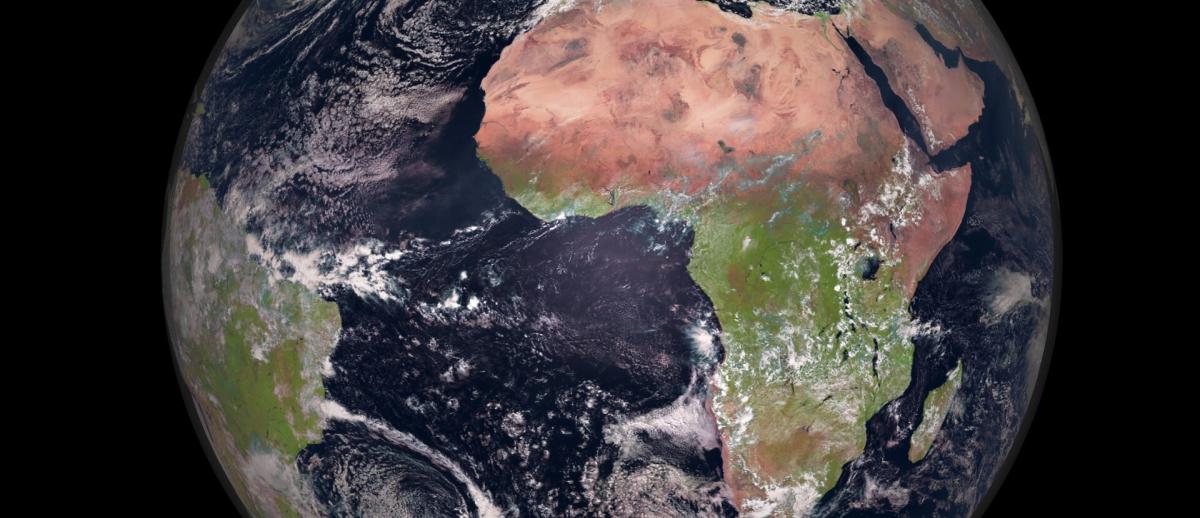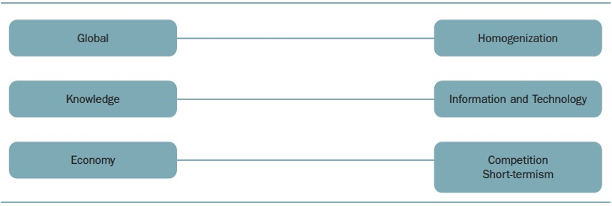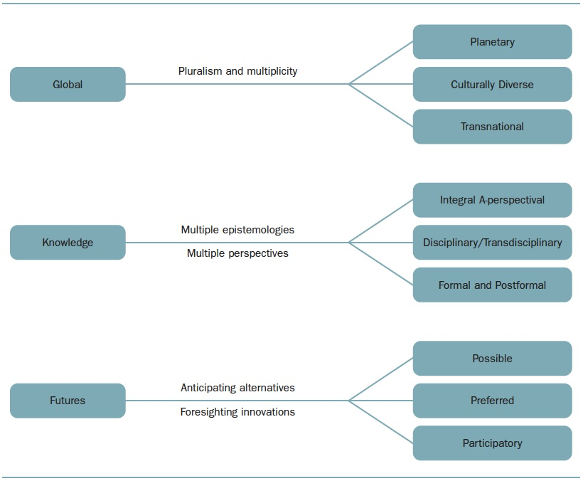Redefining Re-Globalization as Planetization: Upgrading Global Knowledge Futures
archive


Redefining Re-Globalization as Planetization: Upgrading Global Knowledge Futures
What exactly might re-globalization mean in relation to higher education futures,
particularly after the major disruptions of the Covid-19 pandemic and in face of
Russia’s Ukraine war since February 2022?
Considering the 5 R’s of Benedikter and Kofler’s framework theory on re-globalization – refining, reframing, reforming, redefining and revisioning globalization – in my perspective the first three do not go far enough. As a transdisciplinary scholar I see the need for a redefined globalization, which in the future must fully address each and all of the six core dimensions of economy, politics, culture, spirituality, demography and technology stressed elsewhere by Benedikter (Benedikter, 2013:1-15). Neoliberal globalization has focused for too long on the economic and political dimensions, increasingly enhanced by exponential proliferation of technology. Global higher education, and indeed all education, needs to reclaim its rightful place in the overall dimension, to integrate broad literacies, including spirituality, and to value difference across diverse developmental patterns. To enable this, globalization needs to be redefined in ways that embrace new knowledge patterns, and new systems of knowledge integration. In other words, the “new frontiers of globalism” must recognize, and integrate, the “new frontiers of global knowledge futures." What I propose is to redefine globalization as planetization.
Frontiers of Global Knowledge Futures
Arising from my research on evolution of consciousness and its implications for education, I developed a concept called “megatrends of the mind” (Gidley, 2010:1040-1048). These are as important for higher education futures as the megatrends in the external world. Evidence for the evolution of consciousness can be found throughout the 20th century within and across disciplines.
First, the major scholarly disciplines of the sciences, philosophy, and psychology have all evolved over the last century, expanding with transdisciplinarity. Second, there are discourses that theorize new thinking, including adult developmental psychology, cultural evolution, and the evolution of consciousness discourse itself. Finally, several fields identify or enact new levels of consciousness, including postformal studies, integral studies and planetary studies (Gidley, 2007:4-226).
First, there are Postformal Studies. Postformal is the most widely used psychological term to denote higher developmental stages beyond Jean Piaget’s formal operations. Adult developmental psychologists have identified higher levels of postformal reasoning in mature adults, involving complexity, creativity, dialogue, imagination, paradox, pluralism, reflexivity, spirituality, and wisdom (Gidley, 2016).
Second, there are Integral Studies. The term Integral is widely used in relation to cultural evolution. Cultural historian Jean Gebser drew attention to the rise of integral culture since the Renaissance, and increasingly in the 20th century (Gebser, 1948/1985). Integral theorists identify higher-order forms of thinking beyond the specialization of instrumental rationality. Some scholars such as Roland Benedikter and Markus Molz have noted a rise of neo-integrative worldviews that could promote a “rational spirituality” for the coming planetary civilization (Benedikter and Molz 2011). Integral approaches include multiples ways of knowing, being and acting in the world (Gidley, 2010:125-133).
Globalization needs to be redefined in ways that embrace new knowledge patterns, and new systems of knowledge integration.
Third, there are Planetary Studies. The term planetary denotes an anthropo-socio-cultural and ecological framing, and is used to reflect a critical sensibility in light of our current precarious planetary situation. Edgar Morin emphasizes this critical aspect of planetary in referring to the present times as the Planetary Era (Morin & Kern, 1999). Educators, futurists, philosophers, scientists, and sociologists, use planetary as a cultural counterpoint to politico-economic globalization. Many researchers who use planetary were inspired by the notion of planetization of mankind (Chardin, 1969/2004). Pierre Teilhard de Chardin coined the term “planetization” in the middle of the 20th century to denote not domination, but awareness and respect for the richness of cultural diversity—a mega-synthesis through which: “The outcome of the world, the gates of the future . . . will only open to an advance of all together, in a direction in which all together can join and find completion in a spiritual renovation of the earth.” (Chardin, 1959/2002)
Chardin emphasized this cannot by achieved merely by the pressure of external forces—such as totalizing governments—but needs to unfold from within human hearts. The words from Teilhard de Chardin show clearly how planetization contrasts sharply with the cold economic rationalism, and politicization of the neoliberal globalization of the three decades 1990-2020. The latter is a zero sum game where the richest billionaires win all. The Oxfam 2018 Report found that the world's richest 1% got 82% of the wealth generated that year. In a globalization redefined as planetization, with Teilhard de Chardin’s sensibility, everyone wins. This is the re-globalization larg parts of humanity are crying out for in times of uncertainty and inequality.
Neoliberal Globalization and the Global Knowledge Economy
“Where is the wisdom we have lost in knowledge?
Where is the knowledge we have lost in information?” (T.S. Eliot, 1934)
Neoliberalism since the start of the 1990s has not only shaped globalization as we know it but also education. The insinuation of neoliberal economic theory into all walks of life has led to the reframing of education as a subset of the ‘knowledge economy’1. Higher education has been and still is commodified, corporatized, and fragmented by old industrial era thinking. Meanwhile, the audit culture drives the obsession with high-stakes testing in schools contributing to higher levels of anxiety and other mental health issues among students. Borrowing heavily from industrial era metaphors, education is now marketed as a product in a globally competitive “knowledge industry," where students are mere “human capital” or even just “clients."
Following this narrative, in such a knowledge economy, nations and regions scramble to grab market share through creating “science parks," “education cities” and “knowledge hubs." The McDonaldization of education homogenizes and transplants outmoded factory schooling models with little regard to the quality of the learning experience for students or the cultural context it has colonized. In the rush to the top, there is blind disregard for epistemological and cultural diversity, and multiple ways of learning. The global knowledge economy is locked into homogenization, exponential technology, and short-termism.
While the old-paradigm, industrial-era thinking of the knowledge economy still dominates the higher education discourse, this economistic framing misses the richness and diversity of knowledge creation emerging on a planetary scale.

Figure 1: Global Knowledge Economy <–> Neoliberal Globalization
Ironically, some of the most creative, innovative, and dynamic knowledge is being produced and disseminated outside mainstream universities. The ivory tower has been breached by private providers, social movements, niche research institutes, edutainment projects, and since COVD-19, a proliferation of digital education, provided by anyone, anywhere, making it difficult for traditional higher education institutions to compete for market-share. But is competition the best way forward?
Planetization and Global Knowledge Futures
“One of the greatest problems we face today is how to adjust our way of thinking to meet the challenge of an increasingly complex, rapidly changing, unpredictable world. We must rethink our way of organizing knowledge.” (Morin, 2001:5)
In the first quote above, British-American poet T. S. Eliot bemoans the loss of wisdom while French philosopher Edgar Morin hints at its re-awakening here. Perhaps it takes the artistic eye of a poet to perceive the loss of wisdom in the prosaic pragmatism of the Information Era, and a philosopher—a lover of wisdom—to think towards more complex ways of organizing knowledge in the Planetary Era.
In contrast to the reductive and economistic ideologies underlying the global knowledge economy, my term “global knowledge futures” is intended to unsettle those who use the term “knowledge” reductively. Global knowledge futures goes beyond, goes deeper, imagines long time-scales and planetary spaces, and develops and enacts more coherent knowledge integration. I frame it within my understanding that human consciousness is evolving and for the first time in history we can consciously participate in co-creating our futures through conscious evolution. This concept was originally seeded by late 18th century German Idealists and Romantics (Gidley, 2010:345-361).
Leading integrative 20th century thinkers such as Rudolf Steiner, Sri Aurobindo (Aurobindo, 1914/2000) Teilhard de Chardin, and Jean Gebser kept alive the view that human consciousness is evolving beyond materialistic, instrumental rationality to embrace complex, creative, integral, spiritual ways of knowing. Contemporary theorists, including Benedikter, (2013) Ken Wilber (1981/1996; 1980/1996) and myself, have further developed the evolution of consciousness literature. This contemporary research demands a shift from the cynical global knowledge economy to a broadened concept of culturally, intellectually, and spiritually richer global knowledge futures, thus awakening the possibility to redefine globalization as planetization.

Figure 2: Global Knowledge Futures <–> Postformal-Integral-Planetization
The two diagrams help to clearly distinguish the hyper-modernist concept of global knowledge economy (Figure 1) from the semiotically much richer concept of global knowledge futures. Figure 2 shows how the cultural pluralism in global, and the ideological diversity in futures, fold back into knowledge, opening it to multiple epistemologies and multiple perspectives. In this way the frontier discourses of postformal, integral and planetary studies infuse global knowledge futures. This shift is crucial to broadening, redefining and revisioning globalism’s new frontiers.
Redefining Globalization as Planetization
Unlike the emerging postformal, integral Planetary Era, the Information Era has not been a phase of cultural evolution. Blinded by the glitter of exponential technology, its proponents overlooked the evolutionary move beyond two-dimensional, digital information to more complex ways of knowing, more interconnected knowledge patterns, and higher-level systems of knowledge integration.
For neoliberal globalization—narrowly focused on economics and politics—higher education has remained a mere cog in the knowledge economy wheel. If re-globalization could embrace the vast frontiers of global knowledge futures, and broaden its scope to include culture, demography, and spirituality, such a newly configured postformal-, integral-, planetary-imbued globalism could redefine re-globalization as planetization.
1. The ‘knowledge economy’ is based on human capital, intellectual property and high levels of digital technology, and increasingly Machine Intelligence (MI). It remains widely dominated by rather mono-dimensional economic ideologies.
Aurobindo, S., The Life Divine. 2nd American Edition. 1914/2000, Twin Lakes, WI: Lotus Press.
Benedikter, R. and I. Kofler, Globalization's Current Transition Phase: The 5 Rs global-e, 2019.
https://globalejournal.org/global-e/august-2019/globalizations-current-transition-phase-5-rs
Benedikter, R., Global Systemic Shift. A Multidimensional Approach to Understand the Present Phase of Globalization. In: New Global Studies. Edited by Saskia Sassen, Nayan Chanda, Akira Iriye and Bruce Mazlish. De Gruyter and Berkeley Electronic Press, Berkeley and Berlin 2013, Volume 7, Issue 1 (April 2013), pp. 1-15, http://www.degruyter.com/view/j/ngs.2013.7.issue-1/ngs-2012-005/ngs-2012-005.xml?format=INT.
Benedikter, R., and Molz, M., The Rise of Neo-Integrative World Views. Towards A “Rational Spirituality” For The Coming Planetary Civilization? Book Chapter 1. In: M. Hartwig and J. Morgan (ed.s): Critical Realism and Spirituality. Book Series: New Studies in Critical Realism and Spirituality, Routledge London and New York 2011, pp. 29-74 (together with Markus Molz), https://shorturl.at/cmHVY and https://www.taylorfrancis.com/books/edit/10.4324/9780203878293/critical-realism-spirituality-mervyn-hartwig-jamie-morgan?refId=5afb9bf5-27f7-45af-bae5-1fb04d2125c2.
Gebser, J., The Ever-Present Origin. 1949/1985, Athens, Ohio: Ohio University Press.
Gidley, J., The Evolution of Consciousness as a Planetary Imperative: An Integration of Integral Views. Integral Review: A Transdisciplinary and Transcultural Journal for New Thought, Research and Praxis, 2007. 5: p. 4-226. https://integral-review.org/pdf-template-issue.php?pdfName=issue_5_gidley_the_evolution_of_consciousness_as_a_planetary_imperative.pdf
Gidley, J., Globally Scanning for Megatrends of the Mind: Potential Futures of "Futures Thinking". Futures: The journal of policy, planning and futures studies, 2010. 42(10): p. 1040-1048. https://www.sciencedirect.com/science/article/abs/pii/S0016328710001710
Gidley, J., Evolving Higher Education Integrally: Delicate Mandalic Theorising, in Integral Education: New Directions for Higher Learning, S. Esbjörn-Hargens, O. Gunnlaugson, and J. Reams, Editors. 2010, State University of New York Press: New York. p. 345-361.
Gidley, J., An Other View of Integral Futures: De/reconstructing the IF Brand. Futures: The journal of policy, planning and futures studies, 2010. 42(2): p. 125-133. https://www.sciencedirect.com/science/article/abs/pii/S0016328709001670
Gidley, J., Postformal Education: A Philosophy for Complex Futures. Critical Studies of Education, ed. S. Steinberg and K. Tobin. 2016, Dordrecht, Netherlands: Springer International. https://www.springer.com/gp/book/9783319290683
Kohlberg, L., Which Postformal Levels are Stages?, in Adult Development, Volume 2: Models and Methods in the Study of Adolescent and Adult Thought, M. Commons, et al., Editors. 1990, Praeger: Westport, CT. p. 263-268;
Morin, E., Seven Complex Lessons in Education for the Future. 2001, Paris: UNESCO, p.5.
Morin, E. and A.B. Kern, Homeland Earth: A Manifesto for the New Millennium (Translated Sean Kelly, Roger Lapoint) Advances in Systems Theory, Complexity and the Human Sciences, ed. A. Montuori. 1999, Cresskill, NJ: Hampton Press.
Sinnott, J.D., The Development of Logic in Adulthood: Postformal Thought and its Applications. 1998, New York: Springer.
Steiner, R., The Evolution of Consciousness as Revealed through Initiation 1926/1966, [13 Lectures: Wales, August 19 - 31, 1923] London: Rudolf Steiner Press. 198.
Teilhard de Chardin, P., The Future of Man. 1959/2004, New York: Image Books, Doubleday.
Teilhard de Chardin, P., The Phenomenon of Man. 1959/2002, New York: Perennial, pp. 243-245.
T. S. Eliot, 1934, The Rock, lines 12-13.



